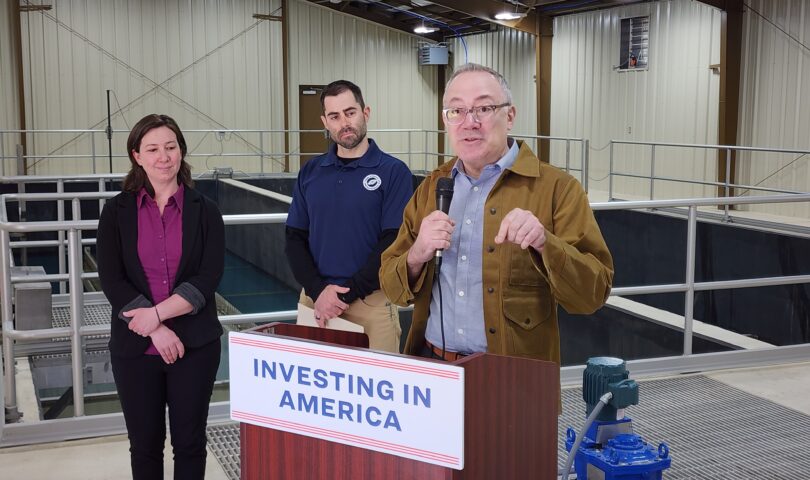MORGANTOWN – Federal officials came to the Richard Mine acid mine drainage treatment plant on Monday to announce the second round of Infrastructure Investment and Jobs Act funding for abandoned mine land reclamation in West Virginia.
Last year, the state received $140 million, said Steve Feldgus, principal deputy assistant secretary for the Department of Interior’s Land and Minerals Management. He announced this year’s round of $140.7 million.
“The reality is that legacy pollution continues to pollute too many of our waterways, neighborhoods, community spaces, and we can’t look away any longer,” he said.
The IIJA provides for $11.3 billion for abandoned mine land restoration across 15 years, enough to enable reclamation of nearly all current and inventoried AML sites in the country.
The Richard Mine plant, he said, is an example of what the IIJA – also called the Bipartisan Infrastructure Bill – can do – cleaning up Deckers Creek and enabling the recovery of critical minerals from the acid mine drainage water for use in cell phones, the national defense and the clean energy economy.
The AMD critical minerals extraction process, he said, was developed by WVU scientists and is helping the state to become a leader in producing the materials needed for the 21st century.
“These funds will support vitally needed jobs for coal communities by funding all types of reclamation projects,” he said.
A press release expands on that. It says AML reclamation supports jobs in coal communities by investing in projects that close dangerous mine shafts, reclaim unstable slopes, improve water quality and restore water supplies damaged by mining. IIJA awards also enable economic revitalization by reclaiming hazardous land for recreational facilities and other redevelopment uses, such as advanced manufacturing and renewable energy deployment.
Local watershed advocates also joined in the announcement.
Brian Hurley, executive director of Friends of Deckers Creek, said, “It has taken Friends of Deckers Creek nearly 30 years to get a treatment system built on the Richard Mine. This ushers in a whole new generation of treatment systems never before possible.”
FODC has built and implemented more treatment systems in this watershed than any other agency, he said, and the impact of FODC and other watershed groups is profound; and the IIJA money is crucial to advance their missions.
“Words do not adequately express what this means for the creek and all the people living downstream,” he said.
Autumn Crowe, interim executive director of the West Virginia Rivers Coalition, said she started her career at FODC. “And now to be here today to celebrate this momentous occasion is a real honor.”
The effort to revive Deckers Creek began 30 years ago, with community members who had a hope and vision of bringing the creek back to life. “We are all here because they never gave up.”
But there are still thousands of miles of streams in this state impaired from heavy metals and acidity, she said. “As we bring life back to Deckers Creek let us also strive to bring life back to all of those other streams that are impacted by acid mine drainage across the state.”
The Bipartisan Infrastructure Law AML funds supplement traditional annual AML grants, which are funded by active coal operations through DOI’s Office of Surface Mining Reclamation and Enforcement. Nationwide, this year’s allotment totals $539.6 million. Funding will be awarded to additional eligible states and Tribes on a rolling basis as they apply.
Email: dbeard@dominionpost.com




